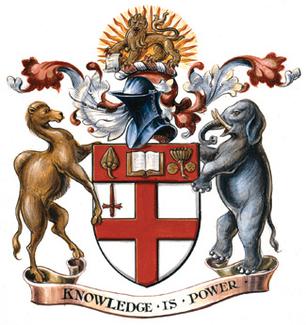
SOAS University of London is a public research university in London, England, and a member institution of the federal University of London. Founded in 1916, SOAS is located in the Bloomsbury area of central London.
Khwārezmian is an extinct East Iranian language closely related to Sogdian. The language was spoken in the area of Khwarezm (Chorasmia), centered in the lower Amu Darya south of the Aral Sea.
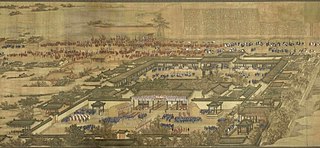
The Hanlin Academy was an academic and administrative institution of higher learning founded in the 8th century Tang China by Emperor Xuanzong in Chang'an.
The Madni Surahs (Surah Madaniyah) or Madani chapters of the Quran are the latest 28 Surahs which, according to Islamic tradition, were revealed at Medina after Muhammad's hijrah from Mecca. The community was larger and more developed, in contrast to its minority position in Mecca.
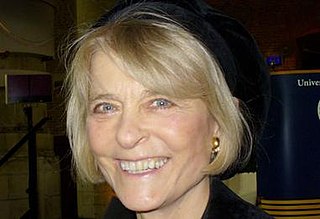
Patricia Crone was a Danish historian specializing in early Islamic history. Crone was a member of the Revisionist school of Islamic studies and questioned the historicity of the Islamic traditions about the beginnings of Islam.
Gerald R. Hawting is a British historian and Islamicist.

Rawwadid or Ravvadid or Banū Rawwād (955–1071) was a Sunni Muslim Kurdish dynasty, centered in the northwestern region of Adharbayjan (Azerbaijan) between the late 8th and early 13th centuries.

Andrew Christopher West is an English Sinologist. His first works concerned Chinese novels of the Ming and Qing dynasties. His study of Romance of the Three Kingdoms used a new approach to analyse the relationship among the various versions, extrapolating the original text of that novel.
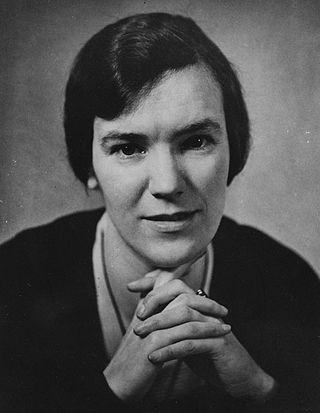
Eileen Edna Le Poer Power was a British economic historian and medievalist.
Edward Ullendorff was a British scholar and historian. He was a prominent figure in Ethiopian Studies and also contributed work on the Semitic languages.
Ernest Julius Walter Simon, was a German sinologist and librarian. He was born in Berlin and lived there, being educated at the University of Berlin, until he fled the Nazis to London in 1934, where he spent all the rest of his life except for brief periods as a visiting professor in various countries, teaching Chinese at the School of Oriental and African Studies, University of London from 1947 to 1960. He made great contributions to historical Chinese phonology and Sino-Tibetan linguistics. As a sinologist, he had a Chinese name, Ximen Huade.

Vladimir Fyodorovich Minorsky was a Russian academic, historian, and scholar of Oriental studies, best known for his contributions to the study of Persian, Lazi, Lurish, and Kurdish history, geography, literature, and culture.

Sir Edward Denison Ross was an orientalist and linguist, specializing in languages of the Middle East, Central and East Asia. He was the first director of the University of London's School of Oriental Studies from 1916 to 1937.
Charles Roskelly Bawden, FBA was a professor of the Mongolian language in the School of Oriental and African Studies (SOAS) at the University of London from 1970 to 1984.
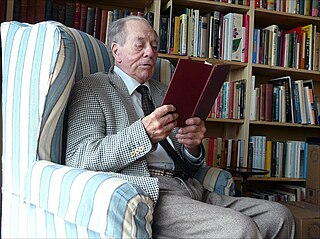
David Llewellyn Snellgrove, FBA was a British Tibetologist noted for his pioneering work on Buddhism in Tibet as well as his many travelogues.

Henri Cordier was a French linguist, historian, ethnographer, author, editor and Orientalist. He was President of the Société de Géographie in Paris. Cordier was a prominent figure in the development of East Asian and Central Asian scholarship in Europe in the late 19th and early 20th century. Though he had little actual knowledge of the Chinese language, Cordier had a particularly strong impact on the development of Chinese scholarship, and was a mentor of the noted French sinologist Édouard Chavannes.
Harry Leonard Shorto was a British philologist and linguist who specialized on the Mon language and Mon-Khmer studies. He authored both a modern Mon dictionary and a dictionary of Mon epigraphy. He worked for most of his career at the School of Oriental and African Studies, University of London, finally as Professor of Mon-Khmer Studies at the University of London until his retirement in 1984.
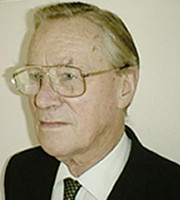
Frank Robert Palmer was a British linguist who was instrumental in the development of the Department of Linguistic Science at the University of Reading.
John E. Cort is an American indologist. He is a professor of Asian and Comparative Religions at Denison University, where he is also Chair of the Department of Religion. He has studied Jainism and the history of Jain society over four decades, authored several books on Jainism, and is one of the editors of the forthcoming Brill Encyclopedia of Jainism. According to a review published in 2006 by Peter Flügel, the influence of the studies and publications of Cort on Jainism "have been immense", and in some respects dominated the field of Jain studies.
Cyril John Gadd, was a British Assyriologist, Sumerologist, and curator. He was Keeper of the Department of Egyptian and Assyrian Antiquities, British Museum from 1948 to 1955, and Professor of Ancient Semitic Languages and Civilizations at the School of Oriental and African Studies, University of London from 1955 to 1960. Having served in the British Army during the First World War, he joined the British Museum after demobilisation and also worked on excavations at Ur, Carchemish, Alalakh and Nimrud. Having risen to Keeper, he left the British Museum to enter academia, and was appointed professor emeritus on his retirement in 1961.










